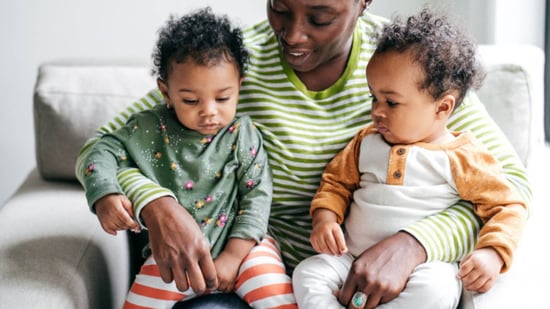Finding the Common Thread: Embracing Diversity in LGBTQ+ Families
Two queer moms share their experience navigating IVF twin pregnancy, LGBTQ+ parenthood, and educating other families.
September 13th, 2023 | 7 min. read

When the ultrasound showed two, healthy, strong heartbeats, the look on my wife’s face was priceless. She turned to our fertility doctor, wondering if he was certain that we were having twins. “Are you sure?” she asked, quickly followed by: “There aren’t any more, are there?”
In this article:
Our IVF Twin Pregnancy Journey
Over the next eight or so months, as my belly grew, so did our fears.
Looking back, our journey to parenthood wasn’t a straight line by any means. We’d become parents in our mid-twenties after a kinship adoption. We’d experienced the highs and lows that adoptive parents know all too well.
But our son wanted siblings. At age eight, he felt our family wasn’t complete - and so did I. I had always wanted to experience pregnancy and motherhood by giving birth. So we made a plan.
We chose an anonymous donor and a fertility doctor. When the pregnancy test came back negative after our first round of IVF, I was terrified to try again. And then we did, a few months later, with the same donor sperm, and a new clinic (Illume Fertility).
This time, our embryo transfer was successful.
I was elated and nervous and so many other emotions. The truth was that due to my own health issues, simply being able to get pregnant wasn’t guaranteed. And if I did get pregnant, we weren't sure if the pregnancy would even be sustainable.
But I carried our babies, along with the weight of what it would mean to be parents of three.
IVF Isn't a Guarantee
We were blessed with two embryos, both girls, who would become known as Aviah and Lera, or Baby A and Baby B, respectively.
Since the inception of IVF in the 1970s, it is estimated that over 12 million children have been born thanks to this popular fertility treatment method, according to the European Society of Human Reproduction and Embryology (ESHRE).
As successful as IVF is, it still can't provide 100% guaranteed results. Just like trying to conceive with a partner on your own, there are many uncertainties along the way - such as whether the pregnancy will be viable or whether getting pregnant is even possible.
Many hopeful parents end up walking away from their fertility clinic after multiple attempts at IVF without success. Knowing this, we are truly grateful to have our two girls.
Parenting In a Two-Mom Family
These days, my wife and I (as a two-mom household) are navigating parenthood with three kids - a teenager who is eager to get his driver’s license, and twin daughters, who recently turned eight years old.
Parenthood doesn’t come with a neatly organized job description. There’s no PTO time! There is certainly no "Employee Handbook," and even with all the books out there on parenting, you quickly learn that each of your children are unique and need to be handled differently.
It’s exhausting and rewarding. It’s confusing at times, and humbling at others.
Navigating New Challenges
As our kids get older, my wife and I navigate this journey as queer parents, but also as the parents of twins. Gone are the days when we needed to pack diaper bags and extra bottles. Gone are the days when we had to struggle to fit a double stroller through the doors of New York City subway cars.
Gone are the days when we had to recall which baby was fed, or tell people not to buy them identical outfits. Gone are the days when we had to explain which baby was which.
Instead, we are now navigating how to nurture who they are as individuals, finding ways to embrace their personalities and unique qualities, and support their ever-changing social lives - not just as parents, but as queer parents.
Our daughters are entering third grade this year, and while they do travel in the same social circle for the most part, they also have different friends. With each encounter, we must come out and say, "Her mom will bring her - we are a two-mom household."
What follows is usually some silence, with the other parent waiting a beat, even over a text RSVP, then replying with something like, "We look forward to having her."
And that ends the conversation.
Communicating With Other Parents
As the planner and go-to scheduler for our family, I am usually the one conversing with the other parents. My wife, who is the extrovert of the two of us, is usually the one who will take Aviah or Lera to birthday parties. And with each party, my wife must explain who we are.
As queer parents, we have that added layer, to come out and explain our family dynamic with each social event for our kids, and that’s ok. We’d rather educate others about our family so they can see what we know our family to be - just like everyone else’s.
We are simply two parents working each day to keep our kids safe and healthy, and hopefully, turn them into future productive contributors to society.
Birthday parties, school events, play dates, and other social engagements are all opportunities for us to help others grow. On top of normal parent exhaustion, my wife and I also have to navigate the exhaustion of helping our kids see that we are equal to other families.
Why don't I have a dad?
Last year, one of our daughters wanted to have a dad because most of her friends have a dad. We shared that we understood that longing, as Mana (my wife) had a dad she is close to who is their Papa now. And we shared that I had a dad who wasn’t there for me - who abandoned me.
We talked about the importance of being a good parent versus just holding the titles of Mom and Dad. But one conversation simply isn’t enough to help them understand these complex concepts.
Embracing Family Diversity
Another incident recently occurred when our daughters and their friends were playing "family" and there HAD to be a mom and dad. Not only that, but the other kids felt that everyone in the family should have matching skin color.
They determined that Aviah was too dark skinned to be in her best friend’s family group.
"Mommy, I was too afraid to say anything," she told me. So we coached her during a follow-up conversation, explaining that her friends need to know the truth about families. "Aviah, does everyone’s hair look the same? Is every flower the same color? Diversity is a part of creation."
We also read "And Tango Makes Three" for their classes, which is the true story of two male penguins raising an abandoned egg. She eventually taught her friends a few things!
We accept we are a family of teachers.
We teach others about gay families with mixed ethnicity.
We spend time with other gay families to help our children embrace our beloved community where no one questions us.
We encourage PRIDE for our children and for others. And it takes work.
On Staying Involved As Queer Moms
As parents, it is important that we take every opportunity to teach our kids and show them how to be in the world, so that when we aren’t physically there to walk them through difficult situations, they know they have the tools to go it alone.
And when it’s time for those birthday parties or school events, I encourage you, as parents, to stay - not just drop and go, but walk inside, show up, observe, interact.
It is our duty, even though we don’t have an official handbook or job description, to continue to educate and inform, to love and provide compassion to others. That is what parenting is about, no matter if you identify as queer or straight.
Our role remains the same: to do and be the best we can for our kids.
In the end, they will live out the legacy we leave for them. And I’ve found that so much of parenting is about leaning into the community of people around you, whether they are family or friends - the ones who show up for us and our kids when we need them the most.
Nikkya Hargrove is an author, mother, and advocate. She is a graduate of Bard College, and a 2012 Lambda Literary Non-Fiction Fellow. Her writing includes topics like same-sex multi-ethnic marriage, becoming a mom as a gay woman, the prison system, and having a special needs child. Nikkya currently lives in New England with her Sri Lankan-American wife and their three children. Her forthcoming memoir, Mama: A Black, Queer Woman’s Journey to Motherhood, is expected in 2024.



